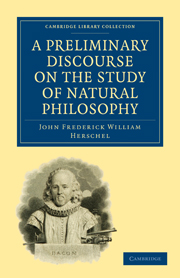Book contents
- Frontmatter
- Contents
- Dedication
- PART I OF THE GENERAL NATURE AND ADVANTAGES OF THE STUDY OF THE PHYSICAL SCIENCES
- PART II OF THE PRINCIPLES ON WHICH PHYSICAL SCIENCE RELIES FOR ITS SUCCESSFUL PROSECUTION, AND THE RULES BY WHICH A SYSTEMATIC EXAMINATION OF NATURE SHOULD BE CONDUCTED, WITH ILLUSTRATIONS OF THEIR INFLUENCE AS EXEMPLIFIED IN THE HISTORY OF ITS PROGRESS
- PART III OF THE SUBDIVISION OF PHYSICS INTO DISTINCT BRANCHES, AND THEIR MUTUAL RELATIONS
- CHAP. I Of the Phenomena of Force, and of the Constitution of Natural Bodies
- CHAP. II Of the Communication of Motion through Bodies. — Of Sound and Light
- CHAP. III Of Cosmical Phenomena
- CHAP. IV Of the Examination of the material Constituents of the World
- CHAP. V Of the Imponderable Forms of Matter
- CHAP. VI Of the Causes of the actual rapid Advance of the Physical Sciences compared with their Progress at an earlier Period
- Index
CHAP. IV - Of the Examination of the material Constituents of the World
Published online by Cambridge University Press: 29 August 2010
- Frontmatter
- Contents
- Dedication
- PART I OF THE GENERAL NATURE AND ADVANTAGES OF THE STUDY OF THE PHYSICAL SCIENCES
- PART II OF THE PRINCIPLES ON WHICH PHYSICAL SCIENCE RELIES FOR ITS SUCCESSFUL PROSECUTION, AND THE RULES BY WHICH A SYSTEMATIC EXAMINATION OF NATURE SHOULD BE CONDUCTED, WITH ILLUSTRATIONS OF THEIR INFLUENCE AS EXEMPLIFIED IN THE HISTORY OF ITS PROGRESS
- PART III OF THE SUBDIVISION OF PHYSICS INTO DISTINCT BRANCHES, AND THEIR MUTUAL RELATIONS
- CHAP. I Of the Phenomena of Force, and of the Constitution of Natural Bodies
- CHAP. II Of the Communication of Motion through Bodies. — Of Sound and Light
- CHAP. III Of Cosmical Phenomena
- CHAP. IV Of the Examination of the material Constituents of the World
- CHAP. V Of the Imponderable Forms of Matter
- CHAP. VI Of the Causes of the actual rapid Advance of the Physical Sciences compared with their Progress at an earlier Period
- Index
Summary
Mineralogy.
(325.) The consideration of the history and structure of our globe, and the examination of the fossil contents of its strata, lead us naturally to consider the materials of which it consists. The history of these materials, their properties as objects of philosophical enquiry, and their application to the useful arts and the embellishments of life, with the characters by which they can be certainly distinguished one from another, form the object of mineralogy, taken in its most extended sense.
(326.) There is no branch of science which presents so many points of contact with other departments of physical research, and serves as a connecting link between so many distant points of philosophical speculation, as this. To the geologist, the chemist, the optician, the crystallographer, the physician, it offers especially the very elements of their knowledge, and a field for many of their most curious and important enquiries. Nor, with the exception of chemistry, is there any which has undergone more revolutions, or been exhibited in a greater variety of forms. To the ancients it could scarcely be said to be at all known, and up to a comparatively recent period, nothing could be more imperfect than its descriptions, or more inartificial and unnatural than its classification. The more important minerals in the arts, indeed, those used for economical purposes and those from which metals were extracted, had a certain degree of attention paid to them, for the sake of their utility and commercial value, and the precious stones for that of ornament.
- Type
- Chapter
- Information
- A Preliminary Discourse on the Study of Natural Philosophy , pp. 290 - 309Publisher: Cambridge University PressPrint publication year: 2009First published in: 1830

